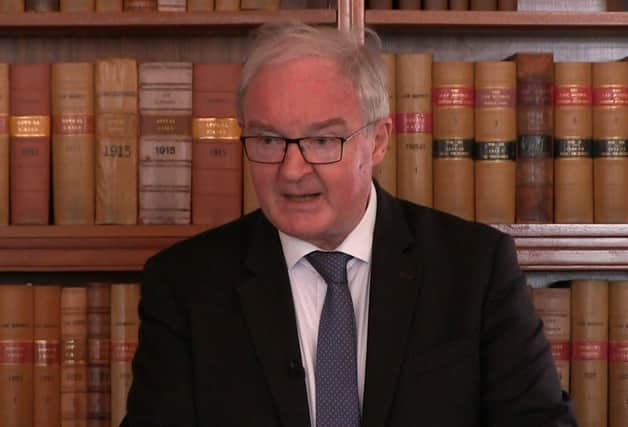Senior judges rule that Stormont has a legal duty to fund a pension scheme for victims of Troubles


Senior judges made the declaration in an ongoing legal battle by one of the so-called Hooded Men to break the political stalemate over who pays the compensation.
In August last year the High Court held that the Executive Office deliberately stymied introduction of the scheme in a bid to force the UK Government into footing the bill.
Advertisement
Hide AdAdvertisement
Hide AdFollowing that verdict the Department of Justice was designated to administer the programme.
Since then, however, a funding dispute between Stormont and Westminster has continued.
A draft budget announced by Sinn Fein Finance Minister Conor Murphy last month only included the administrative costs of pensions.
With no order made in the first court case to provide grant funding, Brian Turley appealed that outcome in a bid to ensure the necessary financial package is immediately put in place.
Advertisement
Hide AdAdvertisement
Hide AdHe was among 14 men detained, forced to wear hoods and subjected to special interrogation methods by the British military as the conflict in Northern Ireland raged during the early 1970s.
His lawyers described the ongoing failure to pay compensation as “outrageous”.
They argued that the scheme, which involves a victims’ board assessing eligibility and the level of payouts, could be wrongly frustrated by up to a year.
Ruling on the appeal today, Lord Chief Justice Sir Declan Morgan backed submissions that there is no discretion involved.
Advertisement
Hide AdAdvertisement
Hide AdHe said: “We declare there is a legal duty on the Executive Office to fund victim’s payments and lump sums under the 2020 Regulations so that the Board can make the necessary payments.
“We express no view on the dispute between the Northern Ireland Executive and the NIO.”
The verdict is the latest stage in Mr Turley’s continuing legal campaign on the issue of compensation for victims of the conflict.
Along with Jennifier McNern, who lost both legs in an IRA bomb attack in Belfast in 1972, he took the original challenge to delays in implementing the pension scheme.
Advertisement
Hide AdAdvertisement
Hide AdAdjourning the outstanding issues in the appeal until March 5, Sir Declan said it was to “allow the parties to find an agreed solution”.
He added: “If that is not possible the case will be re-listed on notice to the Department of Finance as an additional party on that day.”
Outside court Mr Turley’s solicitor, Darragh Mackin, said: “Today’s judgment by the Court of Appeal makes it unequivocally clear that there is, and has always been, a legal duty on the Executive Office to make the payments necessary for the purposes of the legacy victims’ pensions.
“Our client, who is a victim of state-sponsored torture, has waited long enough for the pension payment to which he is entitled.
Advertisement
Hide AdAdvertisement
Hide Ad“Whilst it is regrettable that he has had to pursue litigation of this kind to obtain the pension he is duly entitled, this case again epitomises the importance of judicial review in cases of this kind whereby there are victims’ fundamental rights at stake.”